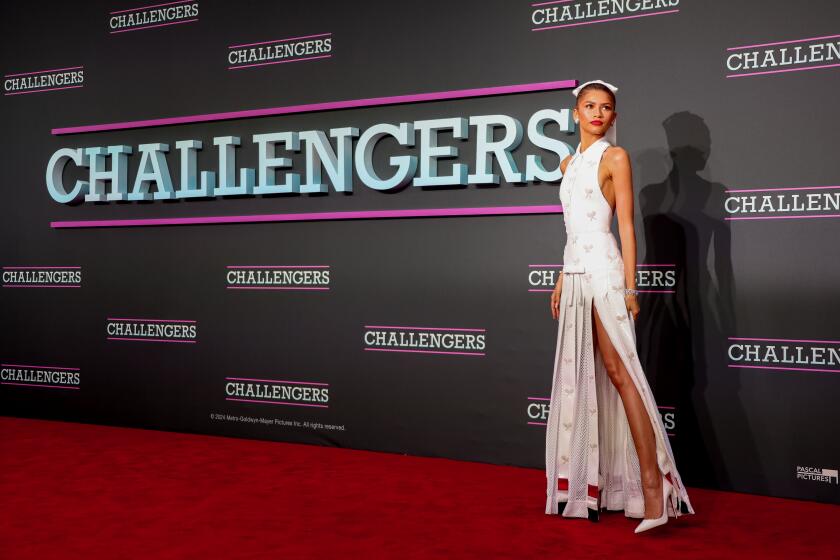The funny outsider
ANDY KINDLER has spent his life onstage attempting to ward off the lowest common denominator in entertainment -- and what thanks has it got him?
While fellow stand-up comics appreciate his meta-take on their business, audiences may recognize him from his recurring role as Ray’s friend Andy on “Everyone Loves Raymond” or for his regular appearances on “The Late Show With David Letterman,” where he does film and TV previews, field pieces and stand-up. But thus far he’s remained something of an outsider, never achieving the kind of outsized success of comics such as Chris Rock or Garry Shandling -- and maybe that’s not so surprising.
For one thing, there’s his incessant challenging of pop culture’s sacred cows. Tonight, Kindler makes his debut on “Lewis Black’s Root of All Evil,” the new Comedy Central show that transforms two comedians into dueling prosecutors, each advocating a chosen cause.
“I thought the show was perfect for his brand of psychosis,” says host Black. “It’s a different take on stand-up.”
Kindler’s first victim? “American Idol.”
“What I object to is that it’s held up as this cultural icon only because it’s popular. Sometimes things can be a guilty pleasure, but with ‘Idol’ everyone talks about it like it’s a real thing; they argue over who’s gonna win. . . . There’s no laughing at it.” As for Simon Cowell, here’s Kindler’s take: “I’m hoping that enough people will dislike him that we reach critical mass . . . and he will go away into the woods.”
For another, Kindler offers a kind of post-modern take on comedy, having over the years absorbed so many tropes, conventions, counter-conventions and meta-analyses that for some it’s an acquired taste. It’s a form, Kindler says, evolved out of “commenting on how hacky [certain comedians] were, with their Jack Nicholson impressions . . . it became fun to make fun of the process.”
It also comes out of a tradition of comedy deconstruction that dates to the ‘50s and the original Mad magazine (Kindler’s father was a friend of Mad’s founder, Harvey Kurtzman). In post-adolescent reflection, Kindler “realized the deconstruction thing had been going on forever and that Mad was a parody of comic books of the time.”
On a recent night in Hollywood, Kindler was in full flight for a 30-minute set at the Upright Citizens Brigade Theatre, riffing on our overwrought technology (he offered up his own version of MySpace, called Friends Ahoy, in which everybody has to have a picture wearing sailing regalia, and “If you date me, it’s all hands on deck!”) as well as the fallout from the writers strike, including a frequent target, Jay Leno. “When Leno went off the air, I thought the strike had been successful, that we had won. We win! Everyone wins!”
Each summer, Kindler’s “State of the Industry” address -- essentially an industry-wide roast -- has become a favorite event at the Just for Laughs festival in Montreal. This is Kindler’s ideal crowd: the under-his-breath footnotes to his jokes are more deeply felt; the references more richly layered. In 2007’s incarnation, he skewered, among others, a dozen comedians, agent Ed Limato and talent agencies in general (“whatever happens, you just hope they land on their feet”), Lorne Michaels and “Saturday Night Live,” O.J. Simpson, Don Imus, Dennis Miller, Michael Richards, Joy Behar and “The View,” “The King of Queens,” “Last Comic Standing” and Comedy Central.
Some embrace his outsider status as eminently relatable. As Eric Stangel, head writer on “The Late Show,” puts it: “We realized that Andy is a fish out of water in any environment he’s in. We don’t need to put him in unusual situations for his comedy to shine through.” Kindler “is the Everyman,” adds Stangel. “He complains like we do. He gets annoyed like we do. And he’s funny in doing so.”
His off-the-radar status allows him to be all too honest. When Letterman offered congratulations after “Raymond” had won an Emmy for best comedy series, Kindler replied: “I just want to say, as a recurring character on the show: Who the hell cares?” Letterman laughed but the audience was clearly taken aback. “How does it help me?” Kindler continued. “I didn’t get an award of any kind . . . there’s nothing on my mantle. . . .”
Kindler’s also become a regular on Public Radio International’s “Fair Game,” where he’s called on for his wisdom in previewing film and television releases and events. Faith Salie, the show’s host, loves having him.
“Usually guests are so careful and thoughtful, he’s so fun to have because he says what he thinks,” she says. “He doesn’t edit himself.”
As much as Kindler judges others, self-deprecation and vulnerability have always been an undercurrent of his oeuvre. Woody Allen has been a key influence in that sense. “I love that whole idea of him being vulnerable, because I always felt vulnerable and insecure.” Not unlike Allen, Kindler is endearing in a way that really softens his bite. “Andy’s so self-deprecating, which is why nobody deserves success more than he does,” says Salie. “He can be so curmudgeonly and so lovable at the same time.”
More to Read
The biggest entertainment stories
Get our big stories about Hollywood, film, television, music, arts, culture and more right in your inbox as soon as they publish.
You may occasionally receive promotional content from the Los Angeles Times.






